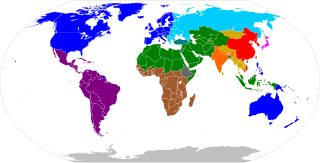
A diaspora is a population that is scattered across regions which are separate from its geographic place of origin. The word is used in reference to people who identify with a specific geographic location, but currently reside elsewhere.
Within the Muslim world, sentiment towards LGBT people varies and has varied between societies and individual Muslims, but is contemporarily quite negative. While colloquial, and in many cases, de facto official acceptance of at least some homosexual behavior was commonplace in pre-modern periods, later developments, starting from the 19th-century, have created a generally hostile environment for LGBT people. Most Muslim-majority countries have opposed moves to advance LGBT rights and recognition at the United Nations (UN), including within the UN General Assembly and the UN Human Rights Council. As of 2021, all countries that have capital punishment for homosexuality base those laws on interpretations of Islamic teachings.

The Middle East is a geopolitical region encompassing the Arabian Peninsula, the Levant, Turkey, Egypt, Iran, and Iraq. The term came into widespread usage as a replacement of the term Near East beginning in the early 20th century. The term "Middle East" has led to some confusion over its changing definitions, and being seen as too Eurocentric. The region includes the vast majority of the territories included in the closely associated definition of West Asia, but without the South Caucasus, and additionally includes all of Egypt and all of Turkey.

Polygyny is a form of polygamy entailing the marriage of a man to several women. The term polygyny is from Neoclassical Greek πολυγυνία (polugunía); from Ancient Greek πολύ (polú) 'many', and γυνή (gunḗ) 'woman, wife'.

The "Clash of Civilizations" is a thesis that people's cultural and religious identities will be the primary source of conflict in the post–Cold War world. The American political scientist Samuel P. Huntington argued that future wars would be fought not between countries, but between cultures. It was proposed in a 1992 lecture at the American Enterprise Institute, which was then developed in a 1993 Foreign Affairs article titled "The Clash of Civilizations?", in response to his former student Francis Fukuyama's 1992 book The End of History and the Last Man. Huntington later expanded his thesis in a 1996 book The Clash of Civilizations and the Remaking of World Order.

The Arab world, formally the Arab homeland, also known as the Arab nation, the Arabsphere, or the Arab states, comprises a large group of countries, mainly located in Western Asia and Northern Africa. While the majority of people in the Arab world are ethnically Arab, there are also significant populations of other ethnic groups such as Berbers, Kurds, Somalis and Nubians, among other groups. Arabic is used as the lingua franca throughout the Arab world.
The practice of Islam by members of the African diaspora may be a consequence of African Muslims retaining their religion after leaving Africa or of people of African ethnicity converting to Islam, as among many African-American Muslims, where conversion is often presented as a recovery of an African heritage lost during the Atlantic slave trade. In many regions, African-diaspora Muslims are an intersectional minority, and may face both racism and anti-Islam sentiment.
Separatism is the advocacy of cultural, ethnic, tribal, religious, racial, governmental, or gender separation from the larger group. As with secession, separatism conventionally refers to full political separation. Groups simply seeking greater autonomy are usually not considered separatists. Some discourse settings equate separatism with religious segregation, racial segregation, or sex segregation, while other discourse settings take the broader view that separation by choice may serve useful purposes and is not the same as government-enforced segregation. There is some academic debate about this definition, and in particular how it relates to secessionism, as has been discussed online.
Lohana are a trading or mercantile jāti mostly in India and also in Pakistan.

Islam is the second-largest religion in Europe after Christianity. Although the majority of Muslim communities in Western Europe formed recently, there are centuries-old Muslim communities in the Balkans, Caucasus, Crimea, and Volga region. The term "Muslim Europe" is used to refer to the Muslim-majority countries in the Balkans and the Caucasus and parts of countries in Eastern Europe with sizable Muslim minorities that constitute large populations of indigenous European Muslims, although the majority are secular.
The Gujarati people, or Gujaratis, are an Indian ethnolinguistic group who reside in or can trace their ancestry or heritage to a region of the Indian subcontinent primarily centered in the present-day western Indian state of Gujarat. They primarily speak Gujarati, an Indian language. While Gujaratis mainly inhabit Gujarat, they have a diaspora worldwide. Gujaratis in India and the diaspora are prominent entrepreneurs and industrialists and maintain high social capital. Many notable independence activists were Gujarati, including Mahatma Gandhi, Muhammad Ali Jinnah and Vallabhbhai Patel.

Religion in Ethiopia consists of a number of faiths. Among these mainly Abrahamic religions, the most numerous is Christianity totaling at 67.3%, followed by Islam at 31.3%. There is also a longstanding but small Ethiopian Jewish community. Some adherents of the Baháʼí Faith likewise exist in a number of urban and rural areas. Additionally, there is also a substantial population of the adherents of traditional faiths.

Overseas Indians, officially Non-Resident Indians (NRIs) and People of Indian Origin (PIOs) are Indians who reside or originate outside of India. According to the Government of India, Non-Resident Indians are citizens of India who currently are not living in India, while the term People of Indian Origin refers to people of Indian birth or ancestry who are citizens of countries other than India. Overseas Citizenship of India (OCI) is given to People of Indian Origin and to persons who are not People of Indian Origin but married to Indian citizen or People of Indian Origin. Persons with OCI status are known as Overseas Citizens of India (OCIs). The OCI status is a permanent visa for visiting India with a foreign passport.

Pakistanis are the citizens and nationals of the Islamic Republic of Pakistan. According to the 2017 Pakistani census, the population of Pakistan stood at over 213 million people, making it the world's fifth-most populous country. The majority of Pakistanis natively speak languages belonging to the Indo-Iranic family.
Chinese people in Turkey are one the ethnic groups of overseas Chinese living in Central Asia. They consist mainly of Chinese-born expatriates living in Turkey and descendants of Chinese migrants. In 2020, there were 18,740 documented Chinese people living in Turkey. A few hundred Chinese students are enrolled in various Turkish universities.

Anti-Western sentiment, also known as anti-Atlanticism or Westernophobia, refers to broad opposition, bias, or hostility towards the people, culture, or policies of the Western world.

An ancestral home is the place of origin of one's extended family, particularly the home owned and preserved by the same family for several generations. The term can refer to an individual house or estate, or to a broader geographic area such as a town, a region, or an entire country. An ancestral home may be a physical place, part of a series of places that one associates with state, nation or region. In the latter cases, the phrase ancestral homeland might be used. In particular, the concept of a diaspora requires the concept of an ancestral home from which the diaspora emanates. However, it is also possible that "[t]he family living in an ancestral home is surrounded by visible, physical symbols of family continuity and solidarity".

The South Asian diaspora, also known as the Desi diaspora, is the group of people whose ancestral origins lie in South Asia, but who live outside the region. There are over 44 million people in this diaspora.

Modern Muslim female athletes have achieved success in a variety of sports, including volleyball, tennis, association football, fencing, and basketball. In the 2016 Summer Olympics, fourteen women from Muslim-majority countries won medals, participating in a wide range of sports.

Immigration has had a major influence on the demographics and culture of the Western world. Immigration to the West started happening in significant numbers during the 1960s and afterward, as Europe made its post-war economic recovery and the United States passed the Immigration and Nationality Act of 1965 allowing non-European immigration.
















